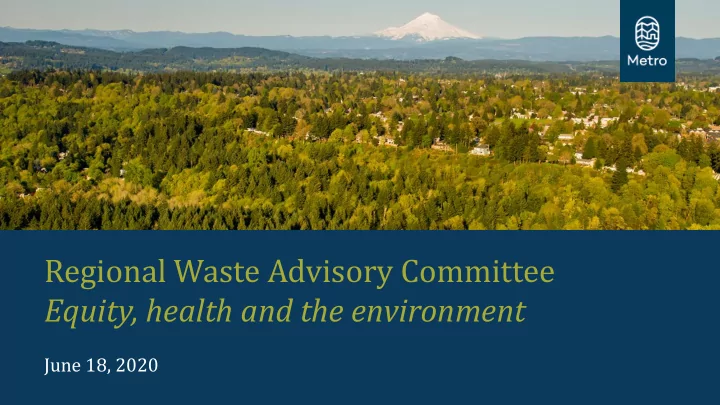

Regional Waste Advisory Committee Equity, health and the environment June 18, 2020
1. Please note that this webinar is being recorded. 2. All attendees have muted cameras and microphones. There will be a public comment period during the meeting, and at that time we will explain again how attendees can raise their hand in order to speak: Look for the Raise Hand icon: If you have called in via phone, you may dial *9 which will let us know you’ve raised your hand to speak. Your microphone will be unmuted when it is your turn to speak. 3. There is no chat or Q&A function during the meeting other than the raise hand function which can be used during the public comment period. If you have any technical difficulties or questions, send me an email: casey.mellnik@oregonmetro.gov
Today’s discussion Welcome Consideration of Minutes (May 21, 2020) Local Governments Update Regional Service Standards Statewide Recycling System Modernization Update Closing and Adjourn Metro | Regional Waste Advisory Committee
Local Government Updates
Regional Service Standards
Regional Service Standards: Code Update Regional Waste Advisory Committee, June 18, 2020
Review • Code is out of date • Does not fit current format • Contains too much detail • Not well-organized • Contains old state statute • Does not reflect the Regional Waste Plan
Specific changes proposed • Split current chapter into two chapters • Group Code sections by sector • Move detail to Administrative Rule
Existing Code Chapter 5.10 Regional Waste Plan Now focuses only on overall Plan authority, applicability, and administration. New Chapter Everything else 5.15 Moving Co. has moved…… 4
New Code Chapter 5.15 Local Government Requirements – Compliance – Financial assistance – Service standards • Residential • Business • Business Food waste • General Education
Chapter 5.15 — Service standards Residential – Combines all residential customers together (single- and multifamily) – Adds minimum service levels for multifamily – Sets the stage for regional color and decal standard – Requires customers receive information about rate components 6
Chapter 5.15 — Service standards Business – Combines all business recycling services in one place – Old dates and obsolete language removed from Business Recycling Requirement – Mostly housekeeping 7
Chapter 5.15 — Service standards General Education – Basic outreach and education that must be provided to all customers – Ensures implementation of state outreach and education requirements 8
Chapter 5.15 — Service standards Business Food Waste – Implementation date moved back one year to March 2021 – Date change process underway now 9
Next steps • Receive comments from you on draft Code • Review draft Administrative Rules with you in July (Part 3) • Broad stakeholder engagement in summer/fall • Code package to Council in winter followed by Administrative Rules to COO 10
Contamination in Recycling Bins
Contamination in Recycling Bins June 18, 2020 Presented by Rosalynn Greene and Pam Peck
Contamination in mixed recyclables 2
Collection of mixed recyclables Step 1 Step 2 Step 3 Step 4 Recyclables are set-out for Mixed recyclables are Recyclables are taken to one Recyclables are shipped collection by: collected by one of the of the Material Recovery locally, domestically or • people living in single 40+ companies providing Facilities (MRF) located in internationally to be family homes, garbage and recycling the Metro region for sorting. processed and recycled. apartments and service in the Metro condos region. • businesses and their employees 3
Building a resilient system Why does decreasing contamination in mixed recyclables matter? • Produce quality materials that can be recycled • Increase efficiency and decrease processing costs • Ensure health and safety of workers • Optimize environmental and human health benefits of recycling 4
RWP Goals and Actions Goal 15 Improve the systems for recyclables, food scraps and yard debris to make them resilient to changing markets and evolving community needs. Actions (10 total) 15.1 Implement regionally consistent contamination reduction efforts to improve material quality, including education, sorting instructions, collection equipment changes and customer feedback methods. 15.3 Develop public private partnerships to expand local markets for priority recyclable materials, with an emphasis on minority-owned and other business owners from historically marginalized groups. 15.4 Fund investments to improve the performance of materials recovery facilities through collection rates and/or other mechanisms 5
RWP Indicators 2. Contamination rates 3. Share of the 1. Recycling regional’s recoverable for outbound contamination recyclables at source materials, by material by sector* separated Material type, that is sent to Recovery Facilities markets in Oregon and the U.S. * Sector refers to the type of customers and includes: • people living in single family homes • people living in apartments or condos • businesses and their employees 6
Data Collection 7
Contaminants in recyclables by sector Other Total Plastic Glass Food Paper 9% Single-family 3% 2% 1% <1% 3% 21% Multifamily 3% 5% 3% 3% 7% 14% Commercial 4% 1% 1% 3% 5% 8
Contamination reduction efforts Regional Contamination Reduction Education Plan -- meets state requirements for communities that select expanded education option under Opportunity to Recycle Act Recycling behavior research -- found high levels of confusion about what goes in the bin Recycle or Not -- cooperative regional effort provides online resources for everyday recyclers Local newsletters, mailings and advertising Residential cart tagging campaigns in Clackamas Co. and Gresham Business technical assistance programs 9
Regional Waste Advisory Committee Next committee meeting: July 16, 2020 8 a.m. – 10 a.m.
Recommend
More recommend